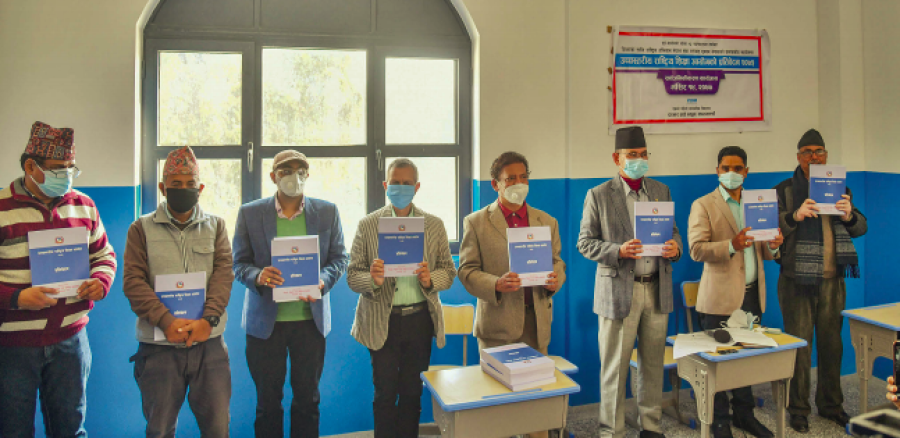National
Education commission members make public report following government reluctance to do so
Thirteen of the 25 members of the commission hope the document will help start a debate in the country.
Binod Ghimire
Majority members of the High-Level National Education Commission on Friday made public its report after the government turned down several requests to do so.
The government in August 2018 had formed a 25-member commission led by Education Minister Giriraj Mani Pokharel comprising education experts, representatives from the teachers’ and private schools’ associations and officials to recommend the government on its education policy.
The commission had submitted its report to Prime Minister KP Sharma Oli on January 15, 2019. But even around two years after the report was submitted, it had not been made public.
“We made several requests to the government to publicise the report. We had even told Minister Pokharel that we will release it on our own, but he asked us to wait for some days,” said Shyam Shrestha, a member of the commission during a programme organised at Durbar High School. “He didn’t stick to his commitment, therefore, we decided to make it public on our own.”
Over 50 percent members –13 of the 25—agreed to publicise the report challenging the government.
Members of the commission present during the programme said it was up to the government to accept the recommendations fully or partially. However, hiding the report is a pure act of dishonesty, they said. “This is an example of unaccountability on the part of government,” said Bidhya Nath Koirala, a professor at Tribhuvan University and a member of the commission. “This is also a violation of the constitutional right to access information by the general public.”
The National Campaign for Education, an umbrella body of over 300 organisations working on the education sector, last year filed a plea under Right to Information Act demanding a copy of the report. But neither the Prime Minister’s Office nor the Education Ministry responded to it positively.
The members claimed the report has been brought to the public domain to initiate a debate. They have been saying that the government, at the behest of the private schools, kept the report a secret.
Concluding that private education had become a profit-making sector, the commission recommends that private schools be transformed from ‘for-profit’ into ‘not-for-profit’. It suggests that schools be given 10 years to undergo such a transformation.
The commission, according to its members, made its recommendations based on Article 31(2) of the constitution, which makes the state responsible to ensure compulsory basic and free secondary education for all. The commission said that leaving private educators to “generate profit”, as they are doing at present, would be tantamount to a breach of the constitution.
Private schools, however, have been objecting to the commission’s recommendations.
Hiring head teachers on contract after evaluating their performance, increasing education budget to at least 20 percent of the national budget as per government commitment and ensuring that every child gets basic education in his/her mother tongue are other major recommendations of the commission.
Despite its global commitment, the proportion of government budget allocated to the education sector has been declining. The share of the education budget, which once reached 17 percent, is now down to just 10 percent.
Allocating at least 20 percent of the national budget or 6.5 percent of the national GDP in education is considered the global norm.
Several commissions have been formed in the education sector over the past decades. However, most of the reports have been left unimplemented. The Pokharel-led commission was the sixth education commission formed since 1955 and third one after the restoration of democracy in 1950.




 18.12°C Kathmandu
18.12°C Kathmandu














